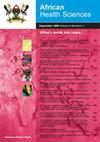尼日利亚已婚育龄妇女生育意识的预测因素:一项横断面调查
IF 0.9
4区 医学
Q3 MEDICINE, GENERAL & INTERNAL
引用次数: 0
摘要
背景:提高生育意识可以帮助不育夫妇实现怀孕。 目的:本研究旨在确定尼日利亚已婚育龄妇女生育意识的预测因素和水平。方法:全国横断面调查。数据通过在线和面对面的问卷调查收集。描述性和推断性分析采用SPSS 25. 结果:大多数受访者的结婚年龄在24-29岁之间(40%),略多于一半的人有良好的生育意识(53%)。相关因素为初潮年龄(X2 = 9.962, p = 0.007)、居住地(X2 = 17.301, p = 0.008)、文化程度(X2 = 64.843, p <0.001)、就业状况(X2 = 9.319 p = 0.025)、月经周期图表(X2 = 66.392, p <0.001),利用互联网提高意识(X2 = 39.849, p <0.001)和书籍(X2 = 58.855, p <0.001)。中等学历人群的生育意识低于研究生(AOR=0.213, 95% CI 0.116 ~ 0.390, p <0.001)。此外,那些没有记录月经周期的女性拥有良好生育意识的几率更低(AOR=0.363, 95% CI 0.245-0.538, p <0.001)强生# x0D;结论:月经周期图表和文化程度是生育意识的预测指标。 关键词:尼日利亚;生育能力;教育的地位;月经周期;互联网。本文章由计算机程序翻译,如有差异,请以英文原文为准。
Predictors of fertility awareness among selected married women of childbearing age in Nigeria: a cross-sectional survey
Background: Increased fertility awareness can help infertile couples to achieve pregnancy.
Objectives: This study aimed to determine both the predictors and levels of fertility awareness among married Nigerian women of childbearing age.
Methods: A nationwide cross-sectional survey. Data were collected via online and face to face questionnaires. Descriptive and inferential analysis were done with SPSS 25.
Results: Most respondents married between ages 24-29 years old (40%) and just over half had good fertility awareness (53%). The associated factors were age at menarche (X2 = 9.962, p = 0.007), geopolitical zone of residence (X2 = 17.301, p = 0.008), level of education (X2 = 64.843, p < 0.001), employment status (X2 = 9.319 p = 0.025) menstrual cycle charting (X2 = 66.392, p < 0.001), use of internet to increase awareness (X2 = 39.849, p < 0.001) and books (X2 = 58.855, p < 0.001). Fertility awareness was lower for those with secondary education than postgraduates (AOR=0.213, 95% CI 0.116-0.390, p < 0.001). Moreover, the odds of having good fertility awareness were less in those who did not chart their menstrual cycle (AOR=0.363, 95% CI 0.245-0.538, p < 0.001).
Conclusion: Menstrual cycle charting and level of education were predictors of fertility awareness.
Keywords: Nigeria; fertility; educational status; menstrual cycle; internet.
求助全文
通过发布文献求助,成功后即可免费获取论文全文。
去求助
来源期刊

African Health Sciences
MEDICINE, GENERAL & INTERNAL-
CiteScore
2.30
自引率
0.00%
发文量
179
审稿时长
>12 weeks
期刊介绍:
The African Health Sciences is an internationally refereed journal publishing original articles on research, clinical practice, public health, policy, planning, implementation and evaluation, in the health and related sciences relevant to Africa and the tropics. Its objectives are to: Advocate for and promote the growth of reading culture in sub Saharan Africa; Provide a high quality journal in which health and policy and other researchers and practitioners in the region can and world wide, can publish their work; Promote relevant health system research and publication in the region including alternative means of health care financing, the burden of and solution of health problems in marginalized urban and rural communities amongst the displaced and others affected by conflict; Promote research and the systematic collection and collation and publication of data on diseases and conditions of equity and influence; Promote development of evidence-based policies and guidelines for clinical, public health and other practitioners. African Health Sciences acknowledges support provided by the African Health Journals Partnership Project that is funded by the US National Institutes of Health (through the National Library of Medicine and the Fogarty International Center) and facilitated by the Council of Science Editors.
 求助内容:
求助内容: 应助结果提醒方式:
应助结果提醒方式:


